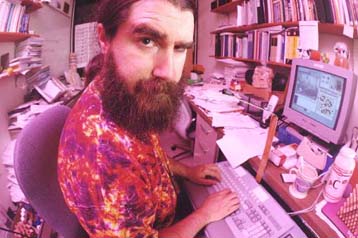
ftp://ftp.research.att.com/dist/eostrom/MOO/html/ProgrammersManual_1.html#SEC1
LambdaMOO is a network-accessible, multi-user, programmable, interactive system well-suited to the construction of text-based adventure games, conferencing systems, and other collaborative software. Its most common use, however, is as a multi-participant, low-bandwidth virtual reality, and it is with this focus in mind that I describe it here.
ftp://ftp.utdallas.edu/pub/ah/moo/TraceBack.pdf
ftp://ftp.utdallas.edu/pub/ah/moo/TraceBack.pdf
LambdaMOO was developed and first launched in (late) 1990.
http://www.artmuseum.net/w2vr/timeline/Curtis.html
Pavel Curtis | World Building
Pavel Curtis, while a computer scientist at Xerox PARC, created one of the first popular on-line role-playing environments, LambdaMOO [requires Telnet], in 1991. Known as a MUD (Multi-User Dungeons), LambdaMOO is a text-only fantasy realm that is descended from sword and sorcery games from the 1970s such as "Dungeons and Dragons." While not the first of its kind, LambdaMOO is perhaps the most famous text-based virtual environment, dissected and analyzed by media theorists, sociologists and psychologists who see it as fertile breeding ground for a new hybrid form of literature, live performance, cinema, and interactive storymaking.
Through the freewheeling dynamics of improvised dialogue and unrehearsed interactivity, participants lose themselves in their roles and collaborate in a form of collective authorship. Shielded (and even liberated) by the anonymity of their characters, players improvise their own conversations, story lines, props, and settings; they pursue their own adventures, and experiment with a myriad of alternate identities; sometimes they even switch gender and, occasionally, species. MUDs are characterized by a tightly knit – though globally dispersed – community of characters engaged in an ongoing dialogue that combines the aimlessness of nomadic wandering with the focused creativity of world building.
ftp://ftp.utdallas.edu/pub/ah/moo/TraceBack.pdf
TraceBack: MOO, Open Source, and the Humanities, by Jan Rune Holmevik